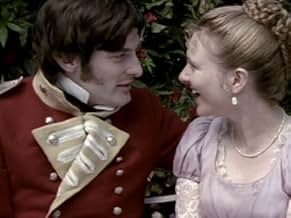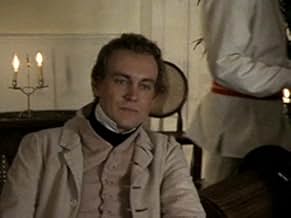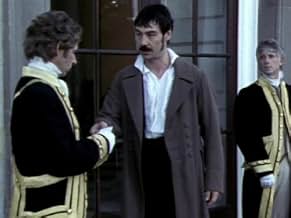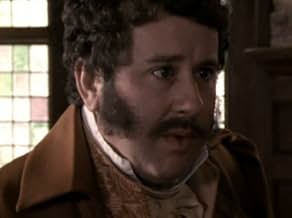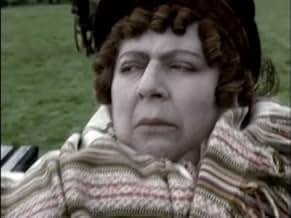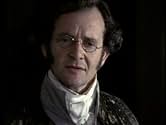La ascensión de Becky Sharp desde orígenes humildes a la alta sociedad y su posterior caída se relata en el contexto de las Guerras Napoleónicas en la Inglaterra y Europa de la era de la Reg... Leer todoLa ascensión de Becky Sharp desde orígenes humildes a la alta sociedad y su posterior caída se relata en el contexto de las Guerras Napoleónicas en la Inglaterra y Europa de la era de la Regencia.La ascensión de Becky Sharp desde orígenes humildes a la alta sociedad y su posterior caída se relata en el contexto de las Guerras Napoleónicas en la Inglaterra y Europa de la era de la Regencia.
- Nominada a6premios BAFTA
- 5 premios ganados y 9 nominaciones en total
Opiniones destacadas
Of course, the novel, and the series, are about far more than one character - they are in fact about Vanity Fair, the world that Thackerary knew and didn't particularly love, the society which was so warped and hypocritical (rather like ours today, in fact) that it allowed characters like Becky Sharp to prosper.
This is not nearly as pleasant as the usual BBC mini-series, but it is compulsively watchable; the depiction is almost flawless and Natasha Little does a brilliant job portraying the woman we love to hate. The rest of the cast is also excellent, including Nathaniel Parker as Rawdon, the principal victim of his wife's intrigues, Philip Glenister as the lovable but awfully clumsy Dobbin and David Bradley as the appalling baronet Sir Pitt Crawley.
Natasha Little is simply perfect as Becky. Little is the kind of woman that women find hard to like: delicately beautiful, exceptionally talented making her perfect to play Becky. It is the subtle nuances in her moments that give her performance great depth and complexity needed for accessibility for a selfish character who is the smartest person in any room she is in. Becky is a woman who would agree with the quote of another brilliant beauty, Hedy Lamar: "Any woman can be glamorous. All she has to do is stand still and look stupid." Little's Beky is not as likable or vulnerable as Reese Witherspoon who played Becky in a major motion picture film version made right around the same time but with a miniseries we have time to understand her more. Besides, not many actresses are as likable as Witherspoon.
As the story begins, this production does not look lavish, but the casting is so wonderful, the script so strong, the costumes simple but just right, that we are given the ability to focus on getting to know the people we will be following through 6 episodes.
It is this initial simplicity that is the brilliance of the production design by Malcolm Thornton. In the early stages, poverty is cramped and messy; work is dark, cluttered and rotting, and wealth is clean, and bright and airy like freedom. As we progress through the story, wealth becomes more complex, overstuffed and overdecorated, echoing the complexity of the lives of Becky and Rawdon. Rawdon played by the handsome and overwhelmingly talented Nathaniel Parker (INSPECTOR LINLEY, BLEAK HOUSE).
Breathtaking Andrew Davies, possibly the most brilliant adapter of the classics of all time, gifts us with a screenplay of grace and subtlety, weaving the ease of modern speech perfectly into the period action in a way that feels classic, but is totally accessible.
It all bounces along to the ohm-pa-pa of a brass band. This band is one of the anachronistic touches of the production. While it passes as a military band, it also has a the raw, slightly under-rehearsed sound of a New Orleans jazz band, and sometimes a 1940s dance hall meanwhile Becky's musical choices are straight from the pub to the delight of the men around her. The band is really the only downfall of the production, in the moments of great serious importance, the band hits us over the head with a blaringly repetitive theme that gets very annoying after 6 episodes. It is the only "wrong note" in an otherwise witty and wise score. One of the nice subtle touches is that even Becky's singing, which at first seems flawless and delightful, begins to sound a bit flat in the episodes where we see dark results of her behavior on those around her.
The music for Amelia and William is completely different. Plaintive melodies played as quietly as loyalty and love that things only of the good of the beloved. Philip Glenister as William carries the heart of the piece with affecting restraint. Miriam Margoles does her best work EVER here, and Jeremy Swift as Jos is absolutely delightful in every moment he is on screen!
This entire miniseries is just marvelous, aspects of the production in tune with each other, in service to the whole piece. FANTASTIC.
As readers of VF will know, the narrator plays a very important part in the book. His sly comments on the 'puppets' (as he often refers to the characters) that perform in his 'play' are frequently funny, exciting and always engaging. If VF is indeed 'a novel without a hero', it is no less engrossing for it. For the story is literally a Fair: characters come and go as the narrator sees fit while we the audience look on with amusement. We start with both Becky Sharp (the main character but not the traditional heroine as Thackeray's contemporary audience would have expected) and Amelia Sedley, and we follow their fortunes and interaction with other characters over some twenty or thirty years. Characters come, characters go; some die, some are born. But nearly always the narrator is there to invite us to feel something towards them: sympathy, repulsion, anger, love. And though he is notable by his absence in the book's most powerful scenes, he will return shortly to talk about something else that another character is getting up to. This is where this adaptation nails the spirit of VF so precisely; it never forgets that these characters are puppets in a play, performing for our entertainment. Traditional bandstand music plays over scenes to reinforce this impression. The comedy elements make us laugh (Jos Sedley and his enormous, well-fed behind trying to mount a horse or carriage), the battle scenes are visceral, the dramatic scenes are engrossing. And the sly comments of the narrator are subtly retained in bizarre camera shots: the fat pig snuffling outside Queen's Crawley, or the beggar playing 'Rule Britannia' with his little bells as the soldiers march off to fight the Battle of Waterloo.
But this would have been for nought if the casting had not been spot on. Natasha Little IS Becky Sharp. Beautiful, alluring, charming, witty, cunning, deceptive and manipulative, she is every man's dream on the outside (I fell in love with her, and I can see all she is getting up to!). One look from her eyes is all that is required to get her climbing the social ladder, which ultimately is all that she wants. Frances Grey is also perfect as Amelia; not as beautiful as Becky, but still pleasant, sweet and kind-hearted, and forever doting on George Osborne. Tom Ward as Osborne was not what I was expecting, yet he got it right: a dashing English officer, strikingly handsome, and not totally devoid of morals, but very easily succumbs to his vanity and pride. Philip Glenister as the only genuinely heroic character in the book (though still not without faults), Dobbin, again is not how I pictured the character, but again nails it perfectly: slightly clumsy, socially awkward, but clear thinking, level-headed and always ready to do the right thing. The rest of the cast play their respective grotesques with equal perfection and relish - to single out each and every one is impossible, though all deserve it.
As a lover of this book, I congratulate all on a job well done. I cannot comment on how someone who has not read VF will like this series, but I can understand that they may be a little bewildered by it all: the occasional dizzy camerawork and loud brass band music. So long as you understand that we are the audience of a colourful, vibrant fair populated by a rich assortment of people, all with faults, all with redeeming features (however materialistic they might be), then I think you should derive great pleasure from it, because more than anything, this is great fun.
¿Sabías que…?
- TriviaThe mauve striped day dress worn by one of Miss Crawley's maids in the Park Lane street is the same costume worn by Anna Massey (Mrs. Norris) in Mansfield Park (1983).
- Citas
Becky Sharp: I'm afraid I will have to charge you rather a lot. My horses are all I own in the world, you know.
Joss Sedley: Money is no object to me, ma'am.
Becky Sharp: That's good. Six hundred pounds.
[Jos is taken aback, but promptly reaches for his pocketbook.]
Becky Sharp: Each.
- ConexionesFeatured in Screenwipe: Episode #2.3 (2006)
- Bandas sonorasSavez-vous Planter Les Chous?
Traditional
Selecciones populares
- How many seasons does Vanity Fair have?Con tecnología de Alexa
Detalles
Contribuir a esta página



